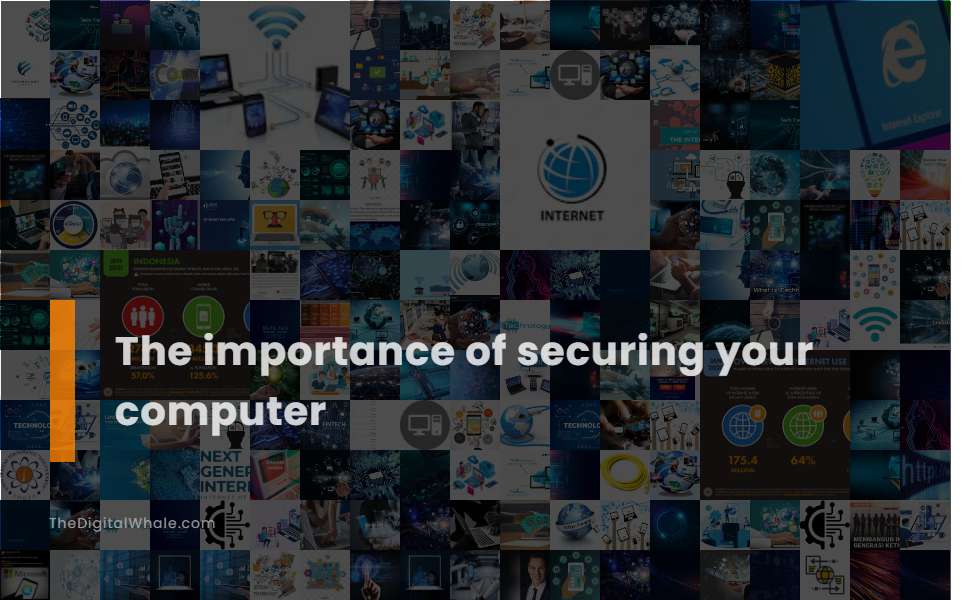The Importance of Securing Your Computer
What are three ways to keep my computer secure? What are some general tips for computer security? Let's find out more about The Importance of Securing Your Computer.

Protecting Personal Data: Safeguarding sensitive information to prevent identity theft and financial loss.
Securing your computer is crucial for protecting personal data, involving measures such as creating strong passwords, avoiding public Wi-Fi, installing anti-virus and anti-spyware software, and ensuring secure web connections to prevent identity theft and financial loss. For more comprehensive strategies and insights on how to safeguard your digital footprint, you can explore ways to protect your personal information on the Chubb website. This guidance can be pivotal in enhancing your online security and minimizing risks associated with cyber threats.
Safeguarding Business Information: Securing financial records, customer databases, and trade secrets to maintain competitive edge and customer trust.
Securing your business's computer systems is crucial for safeguarding financial records, customer databases, and trade secrets. This involves implementing measures such as teaching employees to avoid phishing, requiring strong passwords and multifactor authentication, and keeping business software up to date. To protect sensitive information and maintain both competitive edge and customer trust, explore the guidance provided by Secure Your Business from the Cybersecurity and Infrastructure Security Agency. By adopting these strategies, businesses can ensure resilient and secure operations.
Ensuring Online Transaction Security: Protecting online transactions from fraud and data theft using secure protocols like SSL certificates.
Securing online transactions with SSL certificates is crucial as it encrypts sensitive data, such as credit card numbers and user login credentials, preventing hackers from intercepting or tampering with the information, and authenticates the website's identity to ensure users are interacting with a legitimate site. This encryption protocol, now often referred to as TLS, protects data integrity and confidentiality, making online transactions safe and trustworthy.
Preventing Unauthorized Access: Using strong passwords, multi-factor authentication, and intrusion detection systems to maintain data confidentiality.
Preventing unauthorized access involves implementing strong password policies, regular software updates, multi-factor authentication (MFA), employee security awareness training, and Network Access Control (NAC) solutions to ensure data confidentiality and protect against cyber threats. Implementing MFA adds an extra layer of security, making it harder for attackers to gain access even if passwords are compromised, while strong passwords and regular updates further fortify the system.
Maintaining System Integrity: Regular system updates, vulnerability management, and backup systems to ensure smooth operation.
Maintaining System Integrity is crucial for protecting computer systems, involving regular updates to eliminate software flaws, proactive vulnerability management to prevent cyberattacks, and robust backup systems to ensure data availability and system recovery in case of breaches or disasters. For a deeper understanding, you can visit the System Integrity page. By implementing these measures, organizations can safeguard their digital infrastructure against a myriad of potential threats.
Related:
Can I speed up my internet connection by resetting my router every month? How can I increase my internet speed? Let's find out more about 10 Ways To Speed Up Your Internet Connection.
Ensuring Business Continuity: Implementing incident response plans, disaster recovery strategies, and backup systems to minimize disruption.
Ensuring Business Continuity involves implementing incident response plans to quickly respond to and mitigate cyber threats, disaster recovery strategies to restore operations after major disruptions, and backup systems to minimize data loss and downtime, thereby protecting the organization's operations, reputation, and financial health. For an in-depth guide on this critical topic, you can explore the comprehensive insights provided by the Institute of Data.
Protecting National Security: Defending critical infrastructure from cyber attacks to preserve national security interests.
Securing computers and defending critical infrastructure from cyber attacks is crucial for protecting national security, as it safeguards sensitive government data, ensures the continued operation of essential services like power grids and transportation systems, and prevents disruptions that could have far-reaching impacts on the nation's economy, security, and well-being. For further insights into why cybersecurity is vital for government functions in the digital era, visit the Cybersecurity Blog. Ensuring robust defenses helps maintain public confidence in governmental operations and secures the nation's assets against looming digital threats.
Keeping Software Up-to-Date: Installing the latest security updates for operating systems, web browsers, and other software.
Keeping your software and operating system up to date is crucial for securing your computer, as it patches security flaws, protects your data from cyber threats, and improves overall performance by fixing bugs and enhancing compatibility. Regular updates close vulnerabilities that hackers can exploit, reducing the risk of malware and data breaches. To understand the full significance of these practices, you can explore more at The Importance of General Software Updates and Patches, which provides comprehensive insights into how these updates contribute to a safer digital environment.
Using Antivirus/Anti-Malware Protection: Installing and updating antivirus and anti-malware software from trusted sources.
Installing and updating antivirus and anti-malware software from trusted sources is crucial as it helps prevent malware attacks, scans incoming data, detects advanced malware, and protects against ransomware and other cyber threats, ensuring the security and integrity of your computer system. For more comprehensive insights, refer to the Anti-Malware guide provided by TechTarget.
Backing Up Data Regularly: Ensuring data recovery in case of a security incident by regularly backing up data.
Regular data backups are crucial for ensuring data recovery in case of security incidents such as cyberattacks, hardware failures, or human error, preventing data loss, sustaining business operations, and adhering to regulatory requirements. Backups act as a safety net, allowing for the restoration of systems to a pre-incident state and protecting against ransomware and other malicious attacks. Understanding the Importance of Data Backup in Cybersecurity is essential for safeguarding sensitive information and maintaining the integrity of an organization's digital assets.
Related:
Would you like to learn how to use a password manager? What are the best ways to protect your online privacy? Let's find out more about Tips for Better Internet Privacy.
